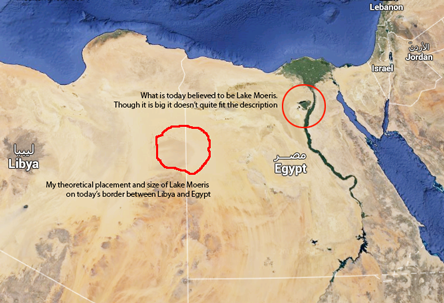It looks like you're using an Ad Blocker.
Please white-list or disable AboveTopSecret.com in your ad-blocking tool.
Thank you.
Some features of ATS will be disabled while you continue to use an ad-blocker.
share:
originally posted by: Utnapisjtim
I give up. You just don't get it. What's called Lake Moeris today is a pond left from when the original lake was emptied sometimes after Herodotus lived and described what he saw. Go read the source itself, you don't need people explaining it. Herodotus Histories book II it's easily available. Read the damn thing, it's not like you have to read the whole book, you should know the verses by know. Herodot explains he witnessed it with his own eyes, and found the whole thing way way more impressive than anything he had seen in Egypt or Greece and back then all of the seven wonders stood solid, meaning this must be the eight wonder. The Dragon himself. Leviathan, complete with divine powers, hooks in the jaws number of the beast, and it's tongue like a raging flood.
You are 'giving up" because I've asked the questions you cannot answer. The 'question' of Lake Moeris has existed for many years - as noted by the many books and papers written on it. The conclusion of those is that Herodotus was mistaken as he relied on travelers reports or unreliable locals to tell him tales when he visited in 446 BC.
The key question you seem to be avoiding was the elevation for lake Moeris at the Lahoun 'exit' as compared to Giza. If you are interested you might want to investigate that.
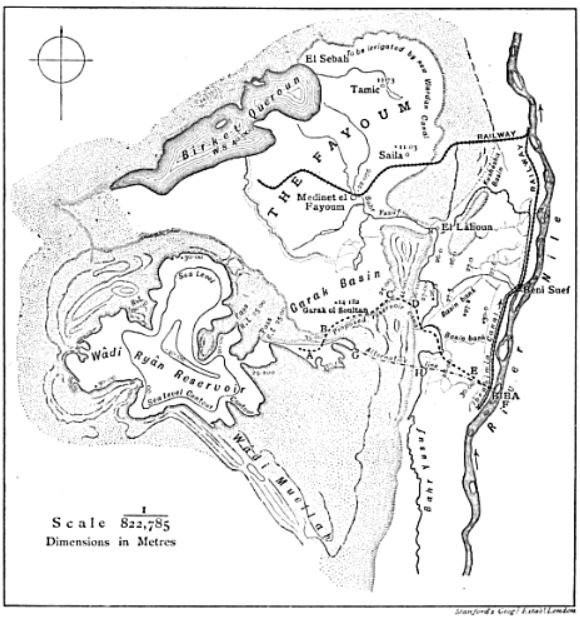
It is from the Lahoun I believe a canal existed to transfer water from the lake to the Nile. The map comes from the book I linked to earlier, page 46.
You also ignored Peter who said the same as I did - just in greater detail and clarity.
originally posted by: Quetzalcoatl14
originally posted by: Hanslune
a reply to: Quetzalcoatl14
Looks like you have a plan. As you probably already know the expatriate life style becomes very addictive - probably because it's great!
Yeah it is pretty amazing. I wouldn't trade my travels for the world. And, there is a difference as you know between taking small vacations abroad, which is still great, and living in a culture and embedding oneself for a while. Most people can't either take the time off to go longer, don't have the money to take a big break in work, or have responsibilities/illness/family things that keep them from
I lived in Europe for four years then off and on in the ME for twenty five+. I gave up and sold my interests there when the Arab Spring hit and am now semi-retired in the boring old continental USA - which is an unknown and exciting country to my foreign wife and me too as I grew up in Hawaii.
Hey one last piece of advice - pick up a foreign spouse too, its adds to the full experience.
edit on 9/11/14 by Hanslune because: (no reason
given)
originally posted by: Utnapisjtim
a reply to: Jarocal
Why would they ever. Nukes turned out fine eh? Now why would the Lettersoup Nations invent and develop the nuclear bomb, it could easily be used against them?!? Common, you can do better than that?
Very valid point - that the dams could be taken both by foreigners or civil opponents and used to destroy the AE themselves.
Strangely there is no record of them ever doing so. Even during the turmoil of the intermediate phases and foreign invasion.
originally posted by: Hanslune
originally posted by: Utnapisjtim
a reply to: Jarocal
Why would they ever. Nukes turned out fine eh? Now why would the Lettersoup Nations invent and develop the nuclear bomb, it could easily be used against them?!? Common, you can do better than that?
Very valid point - that the dams could be taken both by foreigners or civil opponents and used to destroy the AE themselves.
Strangely there is no record of them ever doing so. Even during the turmoil of the intermediate phases and foreign invasion.
My guess would be because water was viewed as a vital resource rather than a weapon. If I am trying to gain control of an area I may raze/sack the towns and cities but to destroy the main source of fertility that allows me the time to consolidate my control over the area is counter productive. Supply trains can keep an army afoot but foraging local resources lessens the cost. Longterm damage to the agricultural infrastructure is not the same as burning a crop field or stealing /slaughtering the majority of the herds. The latter are quickly remedied means to restrict food stores cheaply replaced with a few cargo ships of seed/animals. Destroying the infrastructure to support the crops/herds is a longer term rebuild.
a reply to: Utnapisjtim
Where in Herodotus book does he mention a many days caravan into the desert and back?
Well as far as I can tell he doesn't
Does Diodorus say anything about it? Well yes.
80 stades by the way is about 14 kilometers so from this information how do you get it out in the middle of the Libyan desert?
Where in Herodotus book does he mention a many days caravan into the desert and back?
As for the other kings, they could tell me of no great works which had been produced by them, and they said that they had no renown except only the last of them, Moiris: he (they said) produced as a memorial of himself the gateway of the temple of Hephaistos which is turned towards the North Wind, and dug a lake, about which I shall set forth afterwards how many furlongs of circuit it has, and in it built pyramids of the size which I shall mention at the same time when I speak of the lake itself. He, they said, produced these works, but of the rest none produced any.
Herodotus. Histories II .101 Project Gutenberg
Well as far as I can tell he doesn't
Does Diodorus say anything about it? Well yes.
Diodorus Siculus mentions the lake Moeris had excavated Moeris ... dug a lake of remarkable usefulness , though at the cost of incredible toil. Its circumference, they say is 3600 stades, its depth at most points fifty fathoms. Who, then, on estimating the greatness of construction, would not reasonably ask how many tens of thousands of men must have been employed, and how many years they took to finish their work? No one can adequately commend the king's design, which brings such usefulness and advantage and usefulness to all the dwellers in Egypt. Since the Nile kept to no definite bounds in its rising, and the fruitfulness of the country depended upon the river's regularity, the king dug the lake to accommodate the superfluous water, so that the river should neither, with its strong current, flood the land unseasonably and form swamps and fens, nor, by rising less than was advantageous, damage the crops by lack of water. Between the river and the lake he constructed a canal 80 stades in length and 300 feet in breadth. Through this canal, at times he admitted the water of the river, at other times he excluded it, thus providing the farmers with water at fitting times by opening the inlet and again closing it scientifically and at great expense. No less than 50 talents had of necessity to be expended by anyone who wished to open or shut this sluice. The lake has continued to serve the needs of the Egyptians down to our own days, and it has its name from its constructor, being still called the Lake of Moeris.
Diodorus Siculus, The Historical Library, Books I, LI and LII Translation by W.G.Waddell
80 stades by the way is about 14 kilometers so from this information how do you get it out in the middle of the Libyan desert?
50 fathoms is rather deep to go without hitting bedrock unless taking advantage of a natural lake already in valley
originally posted by: Hanslune
80 stades by the way is about 14 kilometers so from this information how do you get it out in the middle of the Libyan desert?
And where did you find that number? We're not talking about the same thing. Forget the lake called Lake Moeris today. That's merely the wet spot left from when the dam northern/eastern wall of the lake was broken. What Herodotus describes has never been found, and both the Lake Moeris and the gigantic tomb complex and the two pyramids and everything was considered Gr. θαυμάταε (sp?), 'Wonders'. For all we know he might have seen old discarded building plans and marvelled over it's proportions and potential power.
No trace of Crocodilopolis, an artificial lake fitting the description or the labyrinth and tombs, bigger than Keops pyramids has ever been unearthed. For todays official placement we rely on the Muslims who invaded Egypt in the seventh century and renamed all the places. Nothing has been found, and looking for a giant lake, well, you need to work with satellite imagery, which we can today, thank you Google Earth!
edit on 9-11-2014 by
Utnapisjtim because: ...
edit on 9-11-2014 by Utnapisjtim because: wet spot
Yeah, I hear you. I lived in China and Bangladesh, surrounding work. Studied in Guatemala. Although I still love international affairs, history, and
so on, I have settled down for the time being on the East Coast because I have a 5 year old. But, maybe when he is grown or older I'll go live abroad
again.
Foreign wife, nice. Yeah, it is nice to get out of our own culture in that regard as well. I've dated (not married) several women across the world or ones living here who are from other countries. The nice thing about living in NYC is it is very diverse and international for the US. Lots of people coming from all over and living here. My current house here in Brooklyn has a Belgian consultant and a Belgian DJ/music producer and his French girlfriend. Good times.
Foreign wife, nice. Yeah, it is nice to get out of our own culture in that regard as well. I've dated (not married) several women across the world or ones living here who are from other countries. The nice thing about living in NYC is it is very diverse and international for the US. Lots of people coming from all over and living here. My current house here in Brooklyn has a Belgian consultant and a Belgian DJ/music producer and his French girlfriend. Good times.
originally posted by: Hanslune
originally posted by: Quetzalcoatl14
originally posted by: Hanslune
a reply to: Quetzalcoatl14
Looks like you have a plan. As you probably already know the expatriate life style becomes very addictive - probably because it's great!
Yeah it is pretty amazing. I wouldn't trade my travels for the world. And, there is a difference as you know between taking small vacations abroad, which is still great, and living in a culture and embedding oneself for a while. Most people can't either take the time off to go longer, don't have the money to take a big break in work, or have responsibilities/illness/family things that keep them from
I lived in Europe for four years then off and on in the ME for twenty five+. I gave up and sold my interests there when the Arab Spring hit and am now semi-retired in the boring old continental USA - which is an unknown and exciting country to my foreign wife and me too as I grew up in Hawaii.
Hey one last piece of advice - pick up a foreign spouse too, its adds to the full experience.
edit on 9-11-2014 by Quetzalcoatl14
because: (no reason given)
a reply to: Hanslune
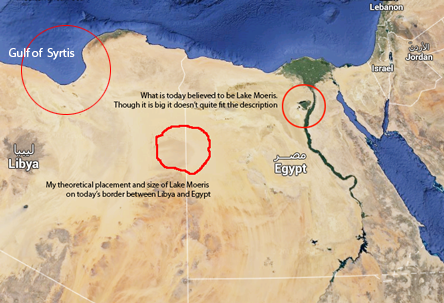
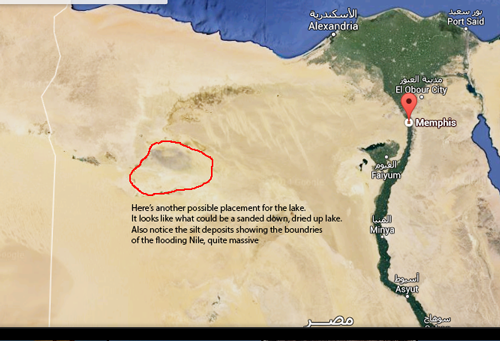
From Herodotus Histories II v. 150:
According to Herodotus the divertive canal system ended in the Gulf of Syrtis which is the same as the Gulf of Sidra today ==> en.wikipedia.org... You can imagine how much sand was dug out when you see the vast shallow sand banks outside the Gulf of Sidra.
ETA: The Lake believed to be Lake Moeris today, is another lake Herodotus writes about in verse 156:


From Herodotus Histories II v. 150:
The local inhabitants also said that this lake drains underground into the Gulf of Syrtis in Libya, since the western part of the lake stretches inland along the mountain range which runs south of Memphis.
According to Herodotus the divertive canal system ended in the Gulf of Syrtis which is the same as the Gulf of Sidra today ==> en.wikipedia.org... You can imagine how much sand was dug out when you see the vast shallow sand banks outside the Gulf of Sidra.
edit on 9-11-2014 by Utnapisjtim because: ...
ETA: The Lake believed to be Lake Moeris today, is another lake Herodotus writes about in verse 156:
So the temple was the most amazing thing I saw in this shrine, but the second morst interesting thing was an island called Chemmis. The sanctuary in Buto is by a deep, wide lake and the island is in the lake; it is said by the Egyptians to be a floating island.
edit on 9-11-2014 by
Utnapisjtim because: eta
originally posted by: [post=18643692]Utnapisjtim
And where did you find that number?
From my good friend Diodorus - the guy you are assuming got his figures right in reporting lake Meoris
We're not talking about the same thing. Forget the lake called Lake Moeris today. That's merely the wet spot left from when the dam northern/eastern wall of the lake was broken. What Herodotus describes has never been found, and both the Lake Moeris and the gigantic tomb complex and the two pyramids and everything was considered Gr. θαυμάταε (sp?), 'Wonders'. For all we know he might have seen old discarded building plans and marvelled over it's proportions and potential power.
Actually I think we are, I'm talking about the real world while you are taking a mistaken comment from Diodorus and thinking it applies not to where it does but hundreds of kilometers to the west.
No trace of Crocodilopolis, an artificial lake fitting the description or the labyrinth and tombs, bigger than Keops pyramids has ever been unearthed. For todays official placement we rely on the Muslims who invaded Egypt in the seventh century and renamed all the places. Nothing has been found, and looking for a giant lake, well, you need to work with satellite imagery, which we can today, thank you Google Earth!
Look under the name Krokodilopolis/Ptolemais Euergetis there's not a lot but it general location is known:
That city
edit on 9/11/14 by Hanslune because: (no reason given)
a reply to: Hanslune
I am not talking about Diodorus. But Herodotus. You know the one I've been quoting all along, the one in the OP. Herodotus calls the prominent island in what is apparently called Lake Moeris today (the one you keep messing on about) -- Chemmis Island. See Herodotus Histories Book II verse 156.
I am not talking about Diodorus. But Herodotus. You know the one I've been quoting all along, the one in the OP. Herodotus calls the prominent island in what is apparently called Lake Moeris today (the one you keep messing on about) -- Chemmis Island. See Herodotus Histories Book II verse 156.
originally posted by: Utnapisjtim
a reply to: Hanslune
I am not talking about Diodorus. But Herodotus. You know the one I've been quoting all along, the one in the OP. Herodotus calls the prominent island in what is apparently called Lake Moeris today (the one you keep messing on about) -- Chemmis Island. See Herodotus Histories Book II verse 156.
You asked where I got the number I told you - you do realize that Diodorus also wrote about Moeris - he too is a source.
Or are you saying everything he says is wrong?
It would seem you are suffering from a not uncommon complaint - one-sourceitis, a deadly disease of the mind where a researcher puts all his eggs in one basket and fixates on one source and only one source. Worse yet you're also showing clear signs of having a bad, bad case of 'ancient writings are a golden source and never wrong'. That one will kill you slowly and surely as the first. Why do you feel Herodotus is 100% accurate?
You do remember don't you that one titles given to Herodotus was not only the title; father of history but also father of lies.

Here is his itinerary for Egypt you'll notice he considered Moeris to be in Upper Egypt and not the western desert - how can that be?
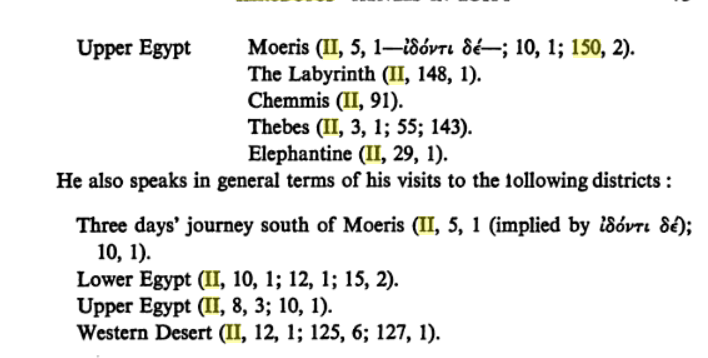
Link to the commentary for Herodotus book II
edit on 9/11/14 by Hanslune because: Added corrected link
a reply to: Utnapisjtim
So I see your original claim also includes the unstated claim that the site which is considered the Labyrinth isn't - by your account it should be in the Libyan desert somewhere - has it been found there?
Herodotus II 149
So I see your original claim also includes the unstated claim that the site which is considered the Labyrinth isn't - by your account it should be in the Libyan desert somewhere - has it been found there?
Herodotus II 149
Such is this labyrinth; but a cause for marvel even greater than this is afforded by the lake, which is called the lake of Moiris, along the side of which this labyrinth is built. The measure of its circuit is three thousand six hundred furlongs (being sixty schoines), and this is the same number of furlongs as the extent of Egypt itself along the sea. The lake lies extended lengthwise from North to South, and in depth where it is deepest it is fifty fathoms. That this lake is artificial and formed by digging is self-evident, for about in the middle of the lake stand two pyramids, each rising above the water to a height of fifty fathoms, the part which is built below the water being of just the same height; and upon each is placed a colossal statue of stone sitting upon a chair. Thus the pyramids are a hundred fathoms high; and these hundred fathoms are equal to a furlong of six hundred feet, the fathom being measured as six feet or four cubits, the feet being four palms each, and the cubits six. The water in the lake does not come from the place where it is, for the country there is very deficient in water, but it has been brought thither from the Nile by a canal: and for six months the water flows into the lake, and for six months out into the Nile again; and whenever it flows out, then for the six months it brings into the royal treasury a talent of silver a day from the fish which are caught, and twenty pounds when the water comes in.
originally posted by: Hanslune
originally posted by: Utnapisjtim
a reply to: Hanslune
I am not talking about Diodorus. But Herodotus. You know the one I've been quoting all along, the one in the OP. Herodotus calls the prominent island in what is apparently called Lake Moeris today (the one you keep messing on about) -- Chemmis Island. See Herodotus Histories Book II verse 156.
You asked where I got the number I told you - you do realize that Diodorus also wrote about Moeris - he too is a source.
And one quoting or paraphrasing Herodotus showing the same dimensions, but obviously confused of it's placing. Herodotus mentions two lakes, one matching the one believed to be Moeris today, Lake Quaroun. Herodotus doesn't name this lake but the island in it, which he calls Chemmis on which there is an Apollo temple with three altars. By the lake is a city he calls Buto, and all of this fits with Lake Quaroun. They even grow the same trees and plants there these days as Herodotus explains.
So that's Lake Quaroun NOT Lake Moeris, which was much bigger almost as big as Lake Victoria, and lay far inland along the mountain range stretching south and west from Memphis, feeding on monsoon water from the Nile, and depositing silted water into the gulf of Libya via underground canals, and irrigating all of Egypt and much of Libya via a network of canals. Things were different back then.
Or are you saying everything he says is wrong?
No, but he must have mistaken Lake Moeris with Lake Quaroun. And he wrote during first century BC and by then Egypt was already a heap of ruins. Lake Moeris had probably already collapsed.
It would seem you are suffering from a not uncommon complaint - one-sourceitis, a deadly disease of the mind where a researcher puts all his eggs in one basket and fixates on one source and only one source. Worse yet you're also showing clear signs of having a bad, bad case of 'ancient writings are a golden source and never wrong'. That one will kill you slowly and surely as the first. Why do you feel Herodotus is 100% accurate?
Some times there is only one source, and a bunch of others refering to it. Then things change.
Unless you noticed, I started off this discussion by stating how Herodotus is something of a red herring and several times I cast doubt over whether what he says is real. As it turns out the other people mentioning the lake, either refer to Herodot or speaks of a completely different, much smaller lake, the one we know today as Lake Quaroun.
You do remember don't you that one titles given to Herodotus was not only the title; father of history but also father of lies.
Here is his itinerary for Egypt you'll notice he considered Moeris to be in Upper Egypt and not the western desert - how can that be?
Link to the commentary for Herodotus book II
You're learning. You should have read that and a few more pages before even entering this discussion.
edit on 10-11-2014 by Utnapisjtim
because: misc
originally posted by: Utnapisjtim
a reply to: Hanslune
No. Like I have said plenty times by now, Lake Moeris has never been found. Get over it and read your opponents' posts before you jump into the ring. Just a hint.
However you are wrong, you don't get to make up geographical truths and impose them on others - lol
originally posted by: Utnapisjtim
And one quoting or paraphrasing Herodotus showing the same dimensions, but obviously confused of it's placing. Herodotus mentions two lakes, one matching the one believed to be Moeris today, Lake Quaroun. Herodotus doesn't name this lake but the island in it, which he calls Chemmis on which there is an Apollo temple with three altars. By the lake is a city he calls Buto, and all of this fits with Lake Quaroun. They even grow the same trees and plants there these days as Herodotus explains.
Yep what is called lake Karoun these days
So that's Lake Quaroun NOT Lake Moeris, which was much bigger almost as big as Lake Victoria, and lay far inland along the mountain range stretching south and west from Memphis, feeding on monsoon water from the Nile, and depositing silted water into the gulf of Libya via underground canals, and irrigating all of Egypt and much of Libya via a network of canals. Things were different back then.
Not it wasn't again you are fully believing what Herodotus wrote even when it doesn't agree with the facts of the ground - was he right about the walls of Babylon? Nope
No, but he must have mistaken Lake Moeris with Lake Quaroun. And he wrote during first century BC and by then Egypt was already a heap of ruins. Lake Moeris had probably already collapsed.
Or you are mistaken - care to show the archaeological evidence of massive AE presence in the Libyan desert around a huge lake with canals connecting it to the Nile?
Some times there is only one source, and a bunch of others refering to it. Then things change.
Yep and sometimes those sources are wrong - remember Herodotus was given title of "Father of lies" why do you think he was given that?
Unless you noticed, I started off this discussion by stating how Herodotus is something of a red herring and several times I cast doubt over whether what he says is real. As it turns out the other people mentioning the lake, either refer to Herodot or speaks of a completely different, much smaller lake, the one we know today as Lake Quaroun.
But you believe everything ELSE he wrote or more correctly you believe those parts which support your story and ignore those that don't - like his itinerary which shows he was in Upper Egypt when he spoke of Moeris, but now you are saying he never got out to the Libyan desert so how is his information correct if he didn't go out there??
Here is his itinerary for Egypt you'll notice he considered Moeris to be in Upper Egypt and not the western desert - how can that be?
Link to the commentary for Herodotus book II
You didn't comment on this too shell shocked to reply?
You're learning. You should have read that and a few more pages before even entering this discussion.
Remember dude you're the one saying that everyone and I mean everyone is wrong and that there is/was a massive lake in the middle of Libyan desert - for which you have ZERO evidence except cherry picked ancient statements - which deal with another part of Egypt - why not read us up some evidence for that eh?
lol
edit on 10/11/14 by Hanslune because: (no reason given)
originally posted by: Hanslune
originally posted by: Utnapisjtim
a reply to: Hanslune
No. Like I have said plenty times by now, Lake Moeris has never been found. Get over it and read your opponents' posts before you jump into the ring. Just a hint.
However you are wrong, you don't get to make up geographical truths and impose them on others - lol
What is it they say about a haughty mind again? You'd might like to revisit the wisdom of the ages one of these days. I think you'd be amazed of what they will pull out of the Sahara in the years to come as more and more satellites are aimed at the dunes to uncover their secrets layer by layer. At the end of last Ice Age Sahara was green and stayed green until the Greeks and the Romans took over. Take a look at www.livescience.com... and www.livescience.com...
edit on 10-11-2014 by Utnapisjtim because: ...
new topics
-
Liberal Madness and the Constitution of the United States
US Political Madness: 1 hours ago -
New York Governor signs Climate Law that Fines Fossil Fuel Companies
US Political Madness: 8 hours ago
top topics
-
This is why ALL illegals who live in the US must go
Social Issues and Civil Unrest: 15 hours ago, 18 flags -
New York Governor signs Climate Law that Fines Fossil Fuel Companies
US Political Madness: 8 hours ago, 12 flags -
UK Borders are NOT Secure!
Social Issues and Civil Unrest: 16 hours ago, 6 flags -
Meta Llama local AI system is scary good
Science & Technology: 13 hours ago, 6 flags -
Liberal Madness and the Constitution of the United States
US Political Madness: 1 hours ago, 1 flags
active topics
-
Mood Music Part VI
Music • 3767 • : BrucellaOrchitis -
‘Something horrible’: Somerset pit reveals bronze age cannibalism
Ancient & Lost Civilizations • 26 • : BrucellaOrchitis -
Liberal Madness and the Constitution of the United States
US Political Madness • 1 • : Flyingclaydisk -
UK Borders are NOT Secure!
Social Issues and Civil Unrest • 7 • : gortex -
Panamanian President-“every square meter” of the Panama Canal belongs to Panama.
New World Order • 47 • : DoubleDNH -
The Mystery Drones and Government Lies --- Master Thread
Political Conspiracies • 154 • : Flyingclaydisk -
New York Governor signs Climate Law that Fines Fossil Fuel Companies
US Political Madness • 12 • : Flyingclaydisk -
Elon Musk futurist?
Dreams & Predictions • 14 • : cherokeetroy -
Trump says ownership of Greenland 'is an absolute necessity'
Other Current Events • 53 • : cherokeetroy -
Happy Hanukkah…
General Chit Chat • 23 • : JJproductions

